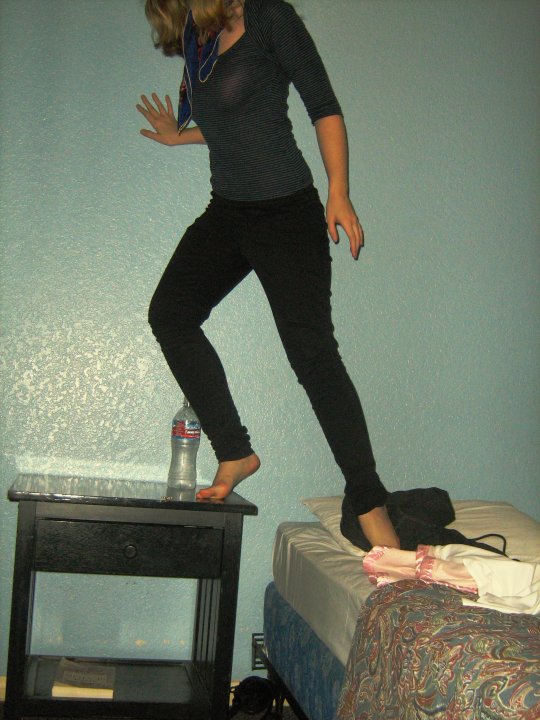Anew No Poetry For U: The Real Outside
Much of the original format of this small, dessicated sack of Internet consisted of a stringing of interesting articles, poems, images, and flicks that I encountered or wanted to store in hard memory--what I really want to do is write a more formal organum based on my former material, mainly a collection of odds (with no ends) in the world of outsider art, literature, and experience with some of my commentary. That is, my main interest encompasses people who are creating interesting material even though they are outside the margins of art or society. These include: ()the mentally ill, the ()cognitively different, ()convicts and prisoners, ()folk or naive artist, and to a smaller degree the ()politically shunned (feminists, eco-activists, etc): including artists who were inspired by the works and ideas of outsiders (de-focusing painting, since it is so widespread).
I will slowly and methodically extinct the former material which does not mesh once this white corner of Internet mulch is replaced by a more harmonic repertoire of nick-knacks, a collection of jars.
Consider this "Under Construction" noisy, obstructive, and soon to be polished.
The best way to navigate through this material is to select a topic or tag and view the elements contained within. You can also relax and simply click on the "next" button at the end of the featured post.
I will slowly and methodically extinct the former material which does not mesh once this white corner of Internet mulch is replaced by a more harmonic repertoire of nick-knacks, a collection of jars.
Consider this "Under Construction" noisy, obstructive, and soon to be polished.
The best way to navigate through this material is to select a topic or tag and view the elements contained within. You can also relax and simply click on the "next" button at the end of the featured post.
!
Saturday, October 2, 2010
Altair and Vega
A young cowherd named Niulang (Chinese: 牛郎; pinyin: niú láng; literally "[the] cowherd"), came across seven fairy sisters bathing in a lake. Encouraged by his mischievous companion the ox, he stole their clothes and waited to see what would happen. The fairy sisters elected the youngest and most beautiful sister Zhinü (simplified Chinese: 织女; traditional Chinese: 織女; pinyin: zhī nǚ; literally "[the] weaver girl", the star Vega) to retrieve their clothing. She agreed to do so, but since Niulang had seen her naked, she agreed to his request for marriage. She proved to be a wonderful wife, and Niulang to be a good husband. They lived happily and had two children. But the Goddess of Heaven (or in some versions, Zhinü's mother) found out that Zhinü, a fairy girl, had married a mere mortal. The Goddess was furious and ordered Zhinü to return to heaven. (Alternatively, the Goddess forced the fairy back to her former duty of weaving colorful clouds, a task she neglected while living on earth with a mortal.) On Earth, Niulang was very upset that his wife had disappeared. Suddenly, his ox began to talk, telling him that if he killed it and put on its hide, he would be able to go up to Heaven to find his wife. Crying bitterly, he killed the ox, put on the skin, and carried his two beloved children off to Heaven to find Zhinü. The Goddess discovered this and was very angry. Taking out her hairpin, the Goddess scratched a wide river in the sky to separate the two lovers forever, thus forming the Milky Way between Altair and Vega.
Zhinü must sit forever on one side of the river, sadly weaving on her loom, while Niulang watches her from afar and takes care of their two children (his flanking stars β and γ Aquilae or by their Chinese names Hè Gu 1 and Hè Gu 3).
But once a year all the magpies in the world would take pity on them and fly up into heaven to form a bridge (鵲橋, "the bridge of magpies", Que Qiao) over the star Deneb in the Cygnus constellation so the lovers may be together for a single night, which is the seventh night of the seventh moon.
Subscribe to:
Post Comments (Atom)
Labels
Archive
-
▼
2010
(63)
-
▼
October
(15)
- Albert Fish 1934
- The Epithalamium of Harry Mathews
- Ghosty Men
- On Schizophrenic Poetry
- The Allegory and the Archive-----Vanessa Place
- Pythagoras and Harmonia
- The Inner Self Helpers
- http://www.vickersgallery.com/services.html
- Pataphysics- Baudrillard (early)
- Constructing a Dream Machine (Brion Gysin)
- Outsider Insider : Aloise Corbaz (1955)
- John Whitney "Catalogue" 1961
- Pimp: The Story of My Life by Iceberg Slim
- Altair and Vega
- Luna Shimada/ Sphere of Light
-
▼
October
(15)
Favorite Arts
Who/]

- LVR
- a blog about fancies, anonymous, and outsider art or art influenced by the outsider.
Powered by Blogger.



No comments:
Post a Comment